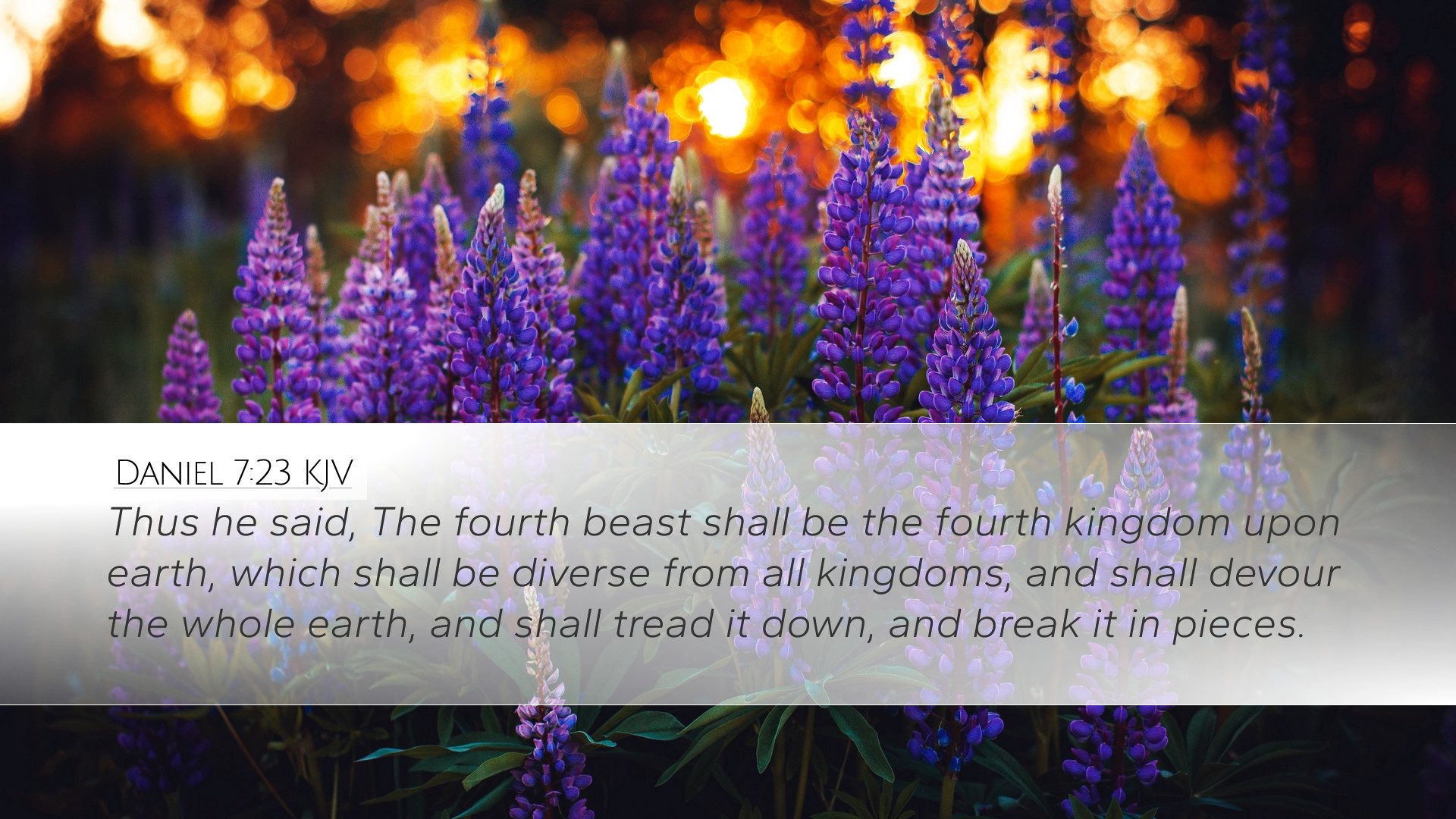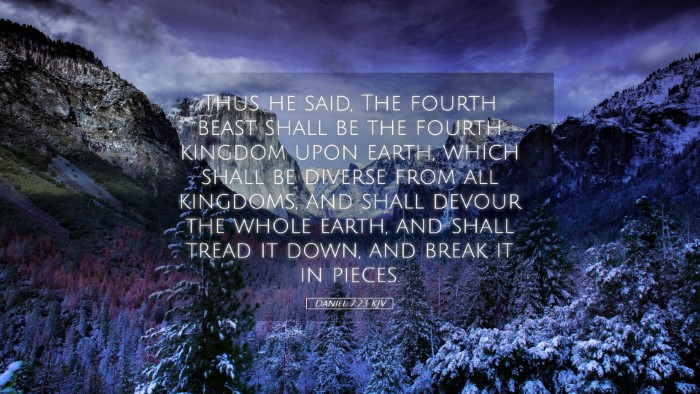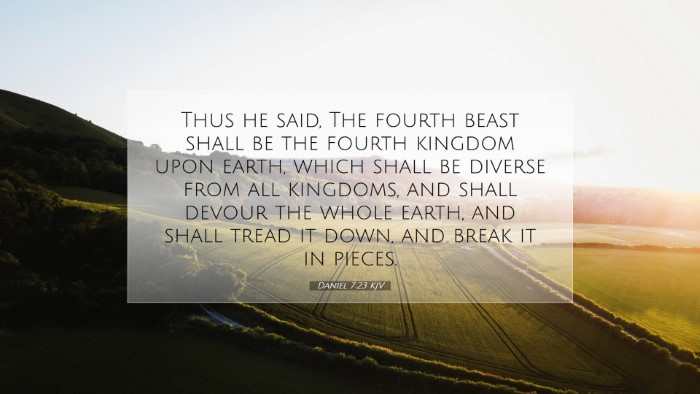Commentary on Daniel 7:23
Verse: "Thus he said: 'The fourth beast shall be a fourth kingdom on earth, which shall be different from all other kingdoms, and shall devour the whole earth, trample it down, and break it to pieces.'" (Daniel 7:23, ESV)
Introduction
The seventh chapter of the Book of Daniel presents a theological and prophetic vision that exposes the dynamics of power and kingdom succession throughout history. Daniel 7:23 specifically offers profound insights into the nature of the fourth beast and its implications for God’s people and the unfolding of divine history. The commentaries by Matthew Henry, Albert Barnes, and Adam Clarke highlight various aspects of this verse that are critical for pastors, students, theologians, and scholars.
Context of the Verse
Before delving into the specific commentary on verse 23, it is essential to grasp the broader context of Daniel Chapter 7. Daniel’s vision includes four beasts that represent four kingdoms, each progressively more fearsome than the last. This apocalyptic literature serves to reassure Israel of God's sovereignty notwithstanding the tumult of earthly powers.
Vision Overview
- The First Beast: A lion with eagle's wings representing Babylon.
- The Second Beast: A bear reflecting the Medo-Persian Empire.
- The Third Beast: A leopard with four wings symbolizing Greece.
- The Fourth Beast: Particularly significant, described as dreadful and terrible, representing a powerful future kingdom.
Insights from Commentaries
Matthew Henry's Commentary
Matthew Henry emphasizes the ferocity and dominance of the fourth beast, highlighting that it will "devour the whole earth" and "trample it down." Henry interprets this as a description of a future kingdom that will be distinct from the preceding ones, underscoring the unparalleled control it will have over the nations. He notes that the language used indicates not only physical domination but also a spiritual and moral degradation that accompanies such authoritarian regimes. He remarks, "It will be a kingdom that is cruel and relentless, characterized by its capacity to oppress and subjugate."
Albert Barnes' Notes
Albert Barnes takes a historical approach, suggesting that the fourth beast represents the Roman Empire, which was both a literal and a spiritual manifestation of power. According to Barnes, the phrase "shall be different from all other kingdoms" emphasizes the unique nature of this empire, which integrates elements of authoritarianism and absolute governance. He posits that the characteristics attributed to this beast reflect both its military might and the socio-political upheaval it caused. Additionally, Barnes notes the eschatological significance of this verse, suggesting that it may also allude to the future Antichrist figure that will arise from this lineage of oppressive governance.
Adam Clarke's Commentary
Adam Clarke offers a detailed exegesis of the metaphorical implications of the fourth beast. He explicates that its ferocity illustrates the stark contrast between God's eternal kingdom and the temporal, earthly powers. Clarke suggests that the “breaking to pieces” metaphor signifies the inevitable collapse of earthly kingdoms when confronted with divine authority. He states, "The triumph of this beast will be but temporary; ultimately, it is destined for destruction by the Kingdom of God." His commentary also includes reflections on how this text reassures believers about God's ultimate sovereignty over history and the assurance of justice.
Theological Implications
Daniel 7:23 evokes critical theological themes relevant for understanding God's oversight of human history, the nature of justice, and the reality of suffering under oppressive regimes. The juxtaposition of God’s kingdom against worldly powers serves as a reminder for believers to maintain hope and faith in divine providence, despite harsh circumstances.
Humanity in the Face of Oppression
For pastors and theologians, this verse encourages a pastoral sensitivity towards congregants who may feel marginalized or oppressed. It invites a reflection on how divine justice and the model of Christ, who endured suffering under Roman authority, provide hope for faithful endurance amid trials.
Prophetic Assurance
Among scholars, the prophetic elements of this passage foster rich discussions on eschatology. Daniel 7 serves as a computation of historical cycles culminating in the ultimate establishment of God's kingdom. The assurance that the tyrannical powers will not prevail is a central theme that resonates throughout the biblical narrative.
Conclusion
Daniel 7:23 richly encapsulates the tensions between earthly kingdoms and divine ultimate authority. It urges believers to discern the transient nature of political power in contrast to the enduring nature of God's reign. The insights from Matthew Henry, Albert Barnes, and Adam Clarke construct a framework for understanding not only the historical context of this verse but also its timeless relevance for faith practice, theological study, and prophetic hope.


